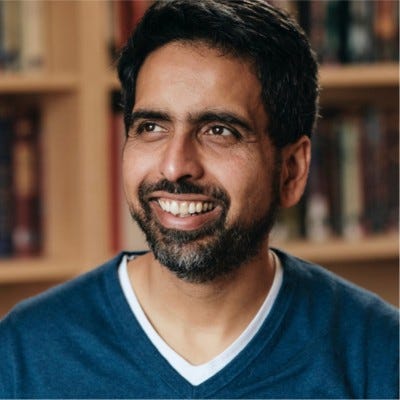#136 - Notes on Learning, Kindergarten and Mastery
Education Coffee is a 2xWeekly Newsletter on People, Ideas and Culture.
Why #LearningResearch?
My thinking on learning has evolved considerably over time. I have built on the work of so many educators and researchers. I am grateful to them for the work they do and the time they took from their schedules to document what they saw and observed in a variety of learning environments. In education like in every other field we must build on the work of others. There are teachers, principals and researchers across the world that may have faced the same problems you face today. In this series of #EducationCoffee newsletters I aim to summarize the work of these thinkers in the most accessible way possible. I will add links to help you with further research.
Mitch Resnick on Lifelong Kindergarten
Mitch Resnick, a prominent figure in the field of educational technology and learning, is best known for his work at the MIT Media Lab, where he leads the Lifelong Kindergarten group. His research focuses on how people learn, particularly through creative and collaborative activities. His research on using technology to learn has helped shape my thinking about learning. You can learn more about his research by following the links.
Here are some key points summarizing his contributions and insights:
Lifelong Kindergarten Approach: Resnick advocates for a learning approach that mirrors the creative and exploratory nature of kindergarten, emphasizing play, projects, peers, passion, and purpose. This approach is not just for children but is applicable to learners of all ages.
Scratch Programming Language: He is the creator of Scratch, a visual programming language designed to help young people learn to think creatively, reason systematically, and work collaboratively. Scratch is widely used in educational settings around the world.
Constructionist Learning: Resnick builds on Seymour Papert’s constructionist theory, which posits that learning is most effective when learners are actively engaged in constructing tangible objects in the real world. This hands-on approach fosters deeper understanding and retention.
Four P’s of Creative Learning: He identifies four core principles that support creative learning: Projects, Passion, Peers, and Play. These elements encourage learners to engage deeply with their interests, collaborate with others, and learn through experimentation and iteration.
Digital Fluency: Resnick emphasizes the importance of not just using technology, but also understanding and creating with it. He argues that digital fluency is essential for full participation in today’s society and economy.
Learning Communities: His research highlights the value of learning communities where individuals share knowledge, collaborate on projects, and support each other’s learning journeys. This communal aspect is crucial for sustaining motivation and fostering innovation.
Assessment and Evaluation: Resnick is critical of traditional assessment methods that focus on standardized testing. He advocates for more nuanced and formative assessment techniques that can capture the complexity of creative and collaborative learning processes.
Global Impact: Through initiatives like the Scratch Foundation and partnerships with educational organizations worldwide, Resnick’s work has had a global impact, influencing how educators think about and implement technology in learning environments.
Mitch Resnick’s research and initiatives continue to shape the landscape of education, promoting a more creative, inclusive, and effective approach to learning for the 21st century.
Salman Khan on Mastery Learning
Salman “Sal” Amin Khan is an American educator and the founder of Khan Academy, a free online non-profit educational platform with which he has produced over 6,500 video lessons teaching a wide spectrum of academic subjects, originally focusing on mathematics and science. His work on mastery learning has helped shape my thinking about learning. You can learn more about his research by following the links.
Here’s a summary of his Philosophy on Learning and Education:
Mastery Learning Over Traditional Grading
Students should master a concept before progressing.
Current systems move students forward with gaps in knowledge, leading to struggles later.
Personalized and Self-Paced Learning
Every student learns at a different speed; education should adapt to them.
Technology can provide individualized learning paths.
Flipped Classroom Approach
Students learn new concepts at home (via videos) and practice in class with teacher support.
This makes classroom time more interactive and focused on problem-solving.
Growth Mindset and Persistence
Struggling is part of learning; failure should not be stigmatized.
Intelligence is not fixed—it grows with effort and time.
Technology as an Equalizer
Free, high-quality education can bridge economic and geographic divides.
Digital tools can help democratize access to world-class learning.
AI and the Future of Education
AI-powered tutors (like Khanmigo) can provide personalized, real-time feedback.
AI can help scale individualized learning, making quality education accessible globally.
Teachers as Facilitators, Not Just Lecturers
Technology should support, not replace, teachers.
Educators should focus on mentoring, coaching, and guiding students.
Rethinking Credentials and Assessments
Degrees should not be the only measure of knowledge or ability.
Competency-based assessments and portfolios should play a bigger role in education and hiring.
Notes and Links
Mitch Resnick Profile – https://mitpress.mit.edu/author/mitchel-resnick-7848/
Mitch Resnick Book – https://mitpress.mit.edu/9780262536134/lifelong-kindergarten/
Mitch Resnick Image Credit – https://en.wikipedia.org/wiki/Mitchel_Resnick#/media/File:Mitchel_Resnick.jpg
Sal Khan Background – https://en.wikipedia.org/wiki/Sal_Khan
Sal Khan Profile – https://www.linkedin.com/in/khanacademy/
Sal Khan - About Khan Academy – https://www.khanacademy.org/about
Abhishek Shetty





